Stress in Mature Age Female Students: Risk Factors and Health Promotion Approaches
VerifiedAdded on 2023/06/08
|7
|1699
|490
AI Summary
This report identifies the factors involved in stress experienced by mature age female students. It covers all the social, political, environmental, economical, and behavioural factors contributing to stress among mature age female students. Health promotion approaches are also discussed.
Contribute Materials
Your contribution can guide someone’s learning journey. Share your
documents today.
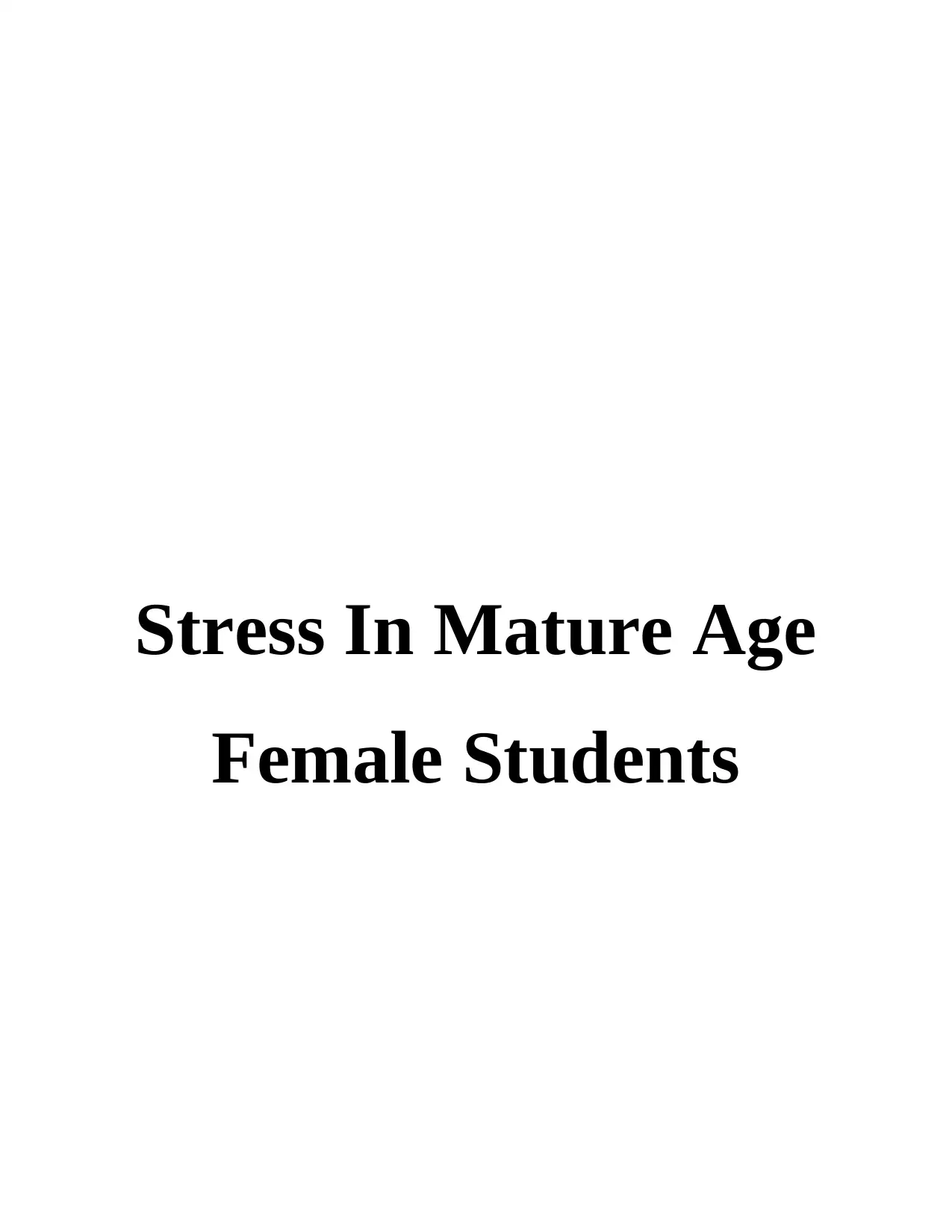
Stress In Mature Age
Female Students
Female Students
Secure Best Marks with AI Grader
Need help grading? Try our AI Grader for instant feedback on your assignments.
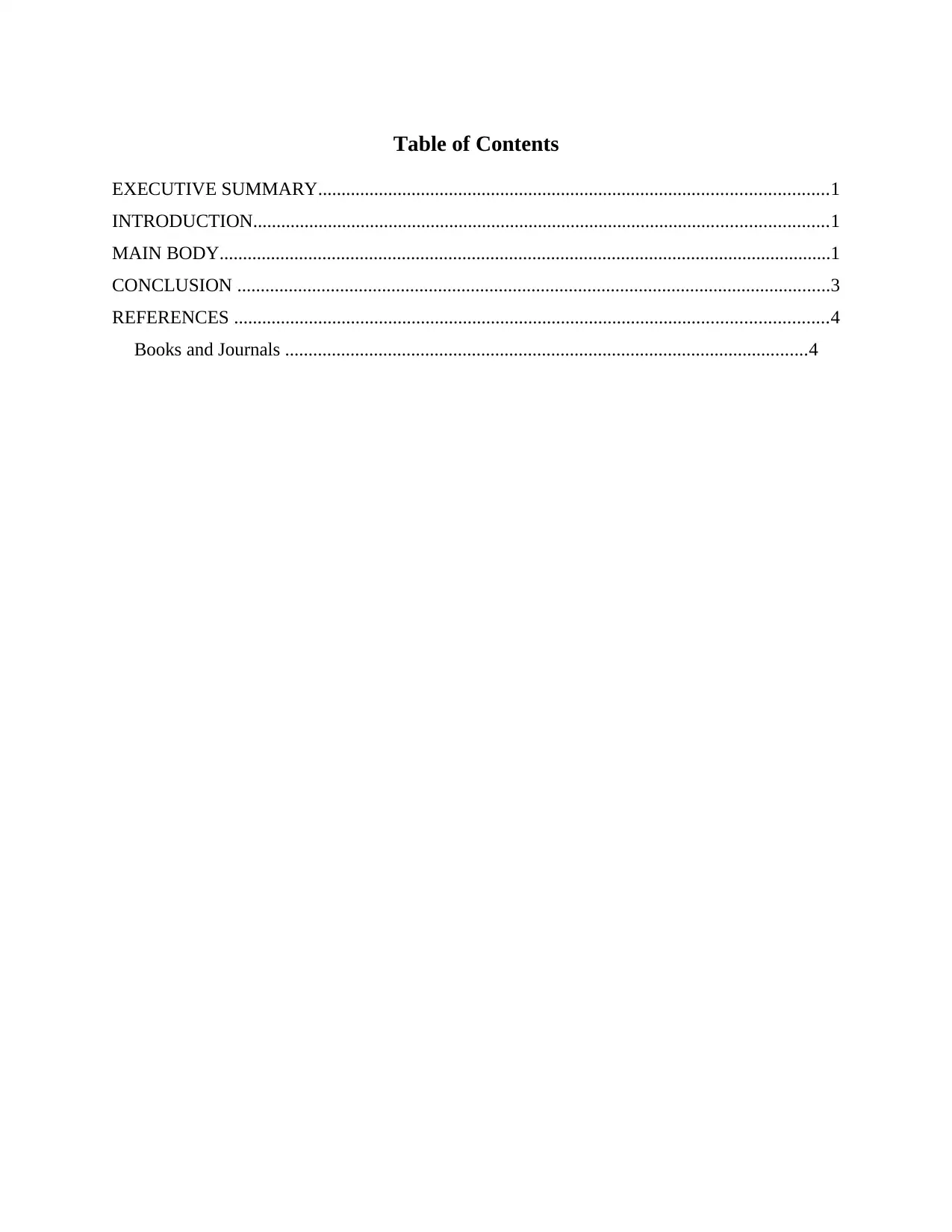
Table of Contents
EXECUTIVE SUMMARY.............................................................................................................1
INTRODUCTION...........................................................................................................................1
MAIN BODY...................................................................................................................................1
CONCLUSION ...............................................................................................................................3
REFERENCES ...............................................................................................................................4
Books and Journals ................................................................................................................4
EXECUTIVE SUMMARY.............................................................................................................1
INTRODUCTION...........................................................................................................................1
MAIN BODY...................................................................................................................................1
CONCLUSION ...............................................................................................................................3
REFERENCES ...............................................................................................................................4
Books and Journals ................................................................................................................4
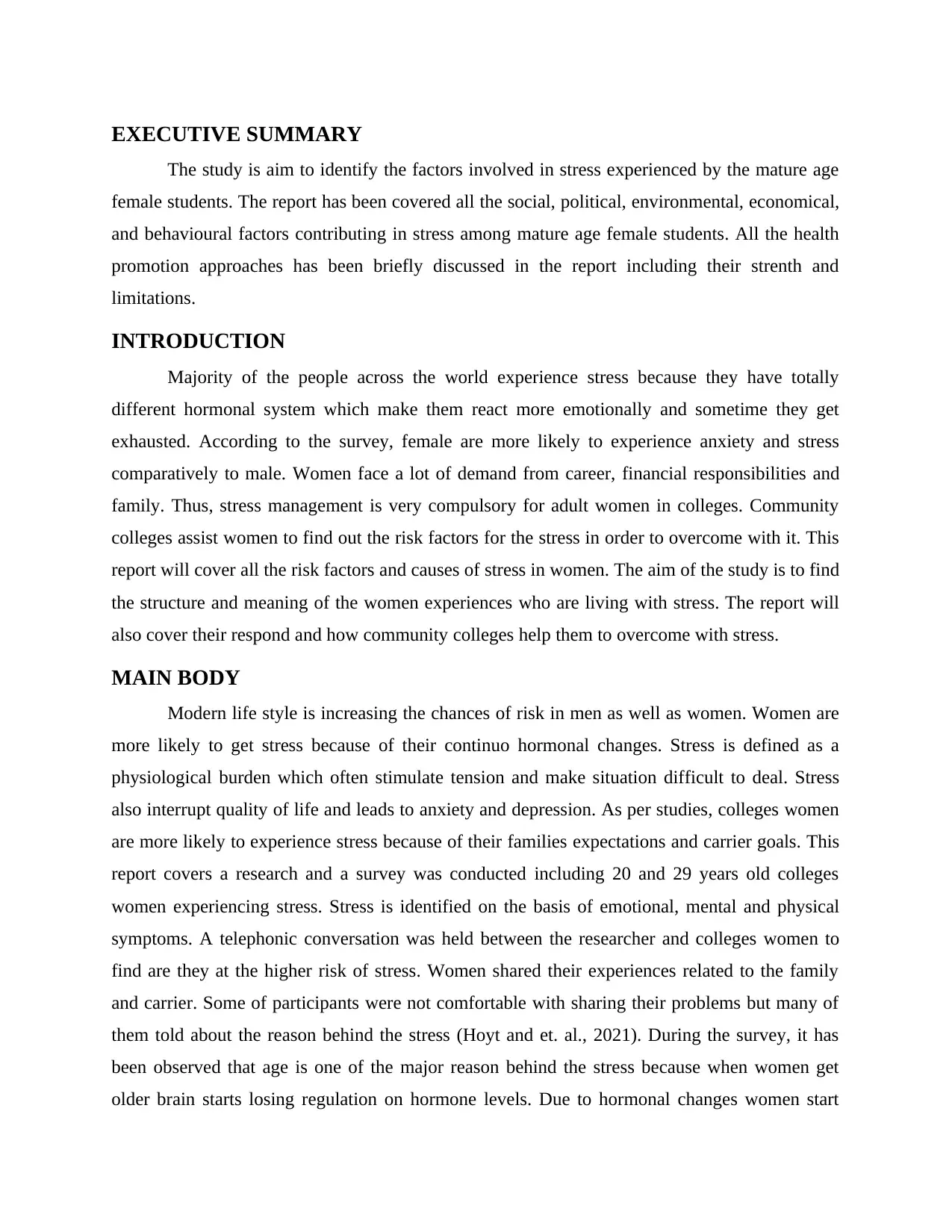
EXECUTIVE SUMMARY
The study is aim to identify the factors involved in stress experienced by the mature age
female students. The report has been covered all the social, political, environmental, economical,
and behavioural factors contributing in stress among mature age female students. All the health
promotion approaches has been briefly discussed in the report including their strenth and
limitations.
INTRODUCTION
Majority of the people across the world experience stress because they have totally
different hormonal system which make them react more emotionally and sometime they get
exhausted. According to the survey, female are more likely to experience anxiety and stress
comparatively to male. Women face a lot of demand from career, financial responsibilities and
family. Thus, stress management is very compulsory for adult women in colleges. Community
colleges assist women to find out the risk factors for the stress in order to overcome with it. This
report will cover all the risk factors and causes of stress in women. The aim of the study is to find
the structure and meaning of the women experiences who are living with stress. The report will
also cover their respond and how community colleges help them to overcome with stress.
MAIN BODY
Modern life style is increasing the chances of risk in men as well as women. Women are
more likely to get stress because of their continuo hormonal changes. Stress is defined as a
physiological burden which often stimulate tension and make situation difficult to deal. Stress
also interrupt quality of life and leads to anxiety and depression. As per studies, colleges women
are more likely to experience stress because of their families expectations and carrier goals. This
report covers a research and a survey was conducted including 20 and 29 years old colleges
women experiencing stress. Stress is identified on the basis of emotional, mental and physical
symptoms. A telephonic conversation was held between the researcher and colleges women to
find are they at the higher risk of stress. Women shared their experiences related to the family
and carrier. Some of participants were not comfortable with sharing their problems but many of
them told about the reason behind the stress (Hoyt and et. al., 2021). During the survey, it has
been observed that age is one of the major reason behind the stress because when women get
older brain starts losing regulation on hormone levels. Due to hormonal changes women start
The study is aim to identify the factors involved in stress experienced by the mature age
female students. The report has been covered all the social, political, environmental, economical,
and behavioural factors contributing in stress among mature age female students. All the health
promotion approaches has been briefly discussed in the report including their strenth and
limitations.
INTRODUCTION
Majority of the people across the world experience stress because they have totally
different hormonal system which make them react more emotionally and sometime they get
exhausted. According to the survey, female are more likely to experience anxiety and stress
comparatively to male. Women face a lot of demand from career, financial responsibilities and
family. Thus, stress management is very compulsory for adult women in colleges. Community
colleges assist women to find out the risk factors for the stress in order to overcome with it. This
report will cover all the risk factors and causes of stress in women. The aim of the study is to find
the structure and meaning of the women experiences who are living with stress. The report will
also cover their respond and how community colleges help them to overcome with stress.
MAIN BODY
Modern life style is increasing the chances of risk in men as well as women. Women are
more likely to get stress because of their continuo hormonal changes. Stress is defined as a
physiological burden which often stimulate tension and make situation difficult to deal. Stress
also interrupt quality of life and leads to anxiety and depression. As per studies, colleges women
are more likely to experience stress because of their families expectations and carrier goals. This
report covers a research and a survey was conducted including 20 and 29 years old colleges
women experiencing stress. Stress is identified on the basis of emotional, mental and physical
symptoms. A telephonic conversation was held between the researcher and colleges women to
find are they at the higher risk of stress. Women shared their experiences related to the family
and carrier. Some of participants were not comfortable with sharing their problems but many of
them told about the reason behind the stress (Hoyt and et. al., 2021). During the survey, it has
been observed that age is one of the major reason behind the stress because when women get
older brain starts losing regulation on hormone levels. Due to hormonal changes women start
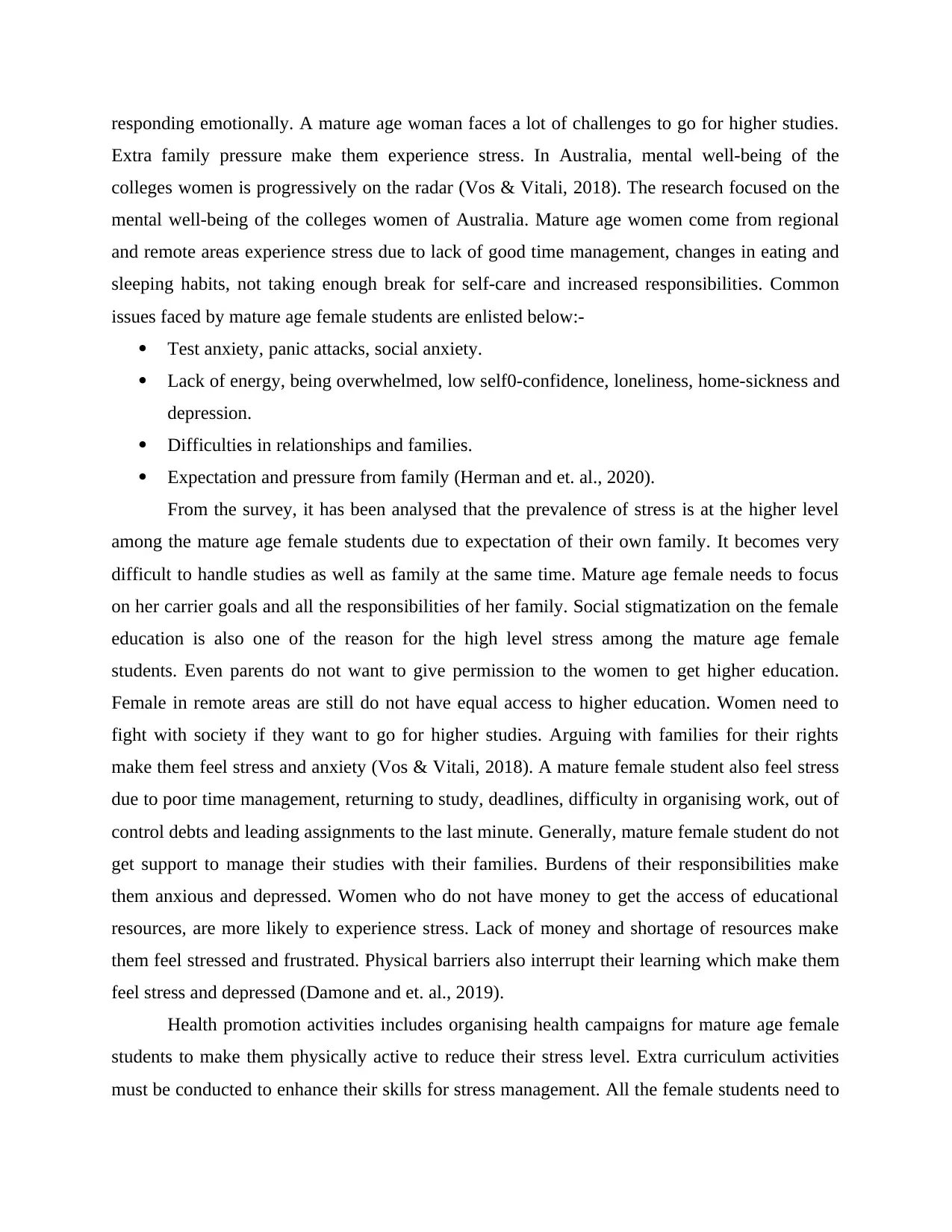
responding emotionally. A mature age woman faces a lot of challenges to go for higher studies.
Extra family pressure make them experience stress. In Australia, mental well-being of the
colleges women is progressively on the radar (Vos & Vitali, 2018). The research focused on the
mental well-being of the colleges women of Australia. Mature age women come from regional
and remote areas experience stress due to lack of good time management, changes in eating and
sleeping habits, not taking enough break for self-care and increased responsibilities. Common
issues faced by mature age female students are enlisted below:-
Test anxiety, panic attacks, social anxiety.
Lack of energy, being overwhelmed, low self0-confidence, loneliness, home-sickness and
depression.
Difficulties in relationships and families.
Expectation and pressure from family (Herman and et. al., 2020).
From the survey, it has been analysed that the prevalence of stress is at the higher level
among the mature age female students due to expectation of their own family. It becomes very
difficult to handle studies as well as family at the same time. Mature age female needs to focus
on her carrier goals and all the responsibilities of her family. Social stigmatization on the female
education is also one of the reason for the high level stress among the mature age female
students. Even parents do not want to give permission to the women to get higher education.
Female in remote areas are still do not have equal access to higher education. Women need to
fight with society if they want to go for higher studies. Arguing with families for their rights
make them feel stress and anxiety (Vos & Vitali, 2018). A mature female student also feel stress
due to poor time management, returning to study, deadlines, difficulty in organising work, out of
control debts and leading assignments to the last minute. Generally, mature female student do not
get support to manage their studies with their families. Burdens of their responsibilities make
them anxious and depressed. Women who do not have money to get the access of educational
resources, are more likely to experience stress. Lack of money and shortage of resources make
them feel stressed and frustrated. Physical barriers also interrupt their learning which make them
feel stress and depressed (Damone and et. al., 2019).
Health promotion activities includes organising health campaigns for mature age female
students to make them physically active to reduce their stress level. Extra curriculum activities
must be conducted to enhance their skills for stress management. All the female students need to
Extra family pressure make them experience stress. In Australia, mental well-being of the
colleges women is progressively on the radar (Vos & Vitali, 2018). The research focused on the
mental well-being of the colleges women of Australia. Mature age women come from regional
and remote areas experience stress due to lack of good time management, changes in eating and
sleeping habits, not taking enough break for self-care and increased responsibilities. Common
issues faced by mature age female students are enlisted below:-
Test anxiety, panic attacks, social anxiety.
Lack of energy, being overwhelmed, low self0-confidence, loneliness, home-sickness and
depression.
Difficulties in relationships and families.
Expectation and pressure from family (Herman and et. al., 2020).
From the survey, it has been analysed that the prevalence of stress is at the higher level
among the mature age female students due to expectation of their own family. It becomes very
difficult to handle studies as well as family at the same time. Mature age female needs to focus
on her carrier goals and all the responsibilities of her family. Social stigmatization on the female
education is also one of the reason for the high level stress among the mature age female
students. Even parents do not want to give permission to the women to get higher education.
Female in remote areas are still do not have equal access to higher education. Women need to
fight with society if they want to go for higher studies. Arguing with families for their rights
make them feel stress and anxiety (Vos & Vitali, 2018). A mature female student also feel stress
due to poor time management, returning to study, deadlines, difficulty in organising work, out of
control debts and leading assignments to the last minute. Generally, mature female student do not
get support to manage their studies with their families. Burdens of their responsibilities make
them anxious and depressed. Women who do not have money to get the access of educational
resources, are more likely to experience stress. Lack of money and shortage of resources make
them feel stressed and frustrated. Physical barriers also interrupt their learning which make them
feel stress and depressed (Damone and et. al., 2019).
Health promotion activities includes organising health campaigns for mature age female
students to make them physically active to reduce their stress level. Extra curriculum activities
must be conducted to enhance their skills for stress management. All the female students need to
Secure Best Marks with AI Grader
Need help grading? Try our AI Grader for instant feedback on your assignments.
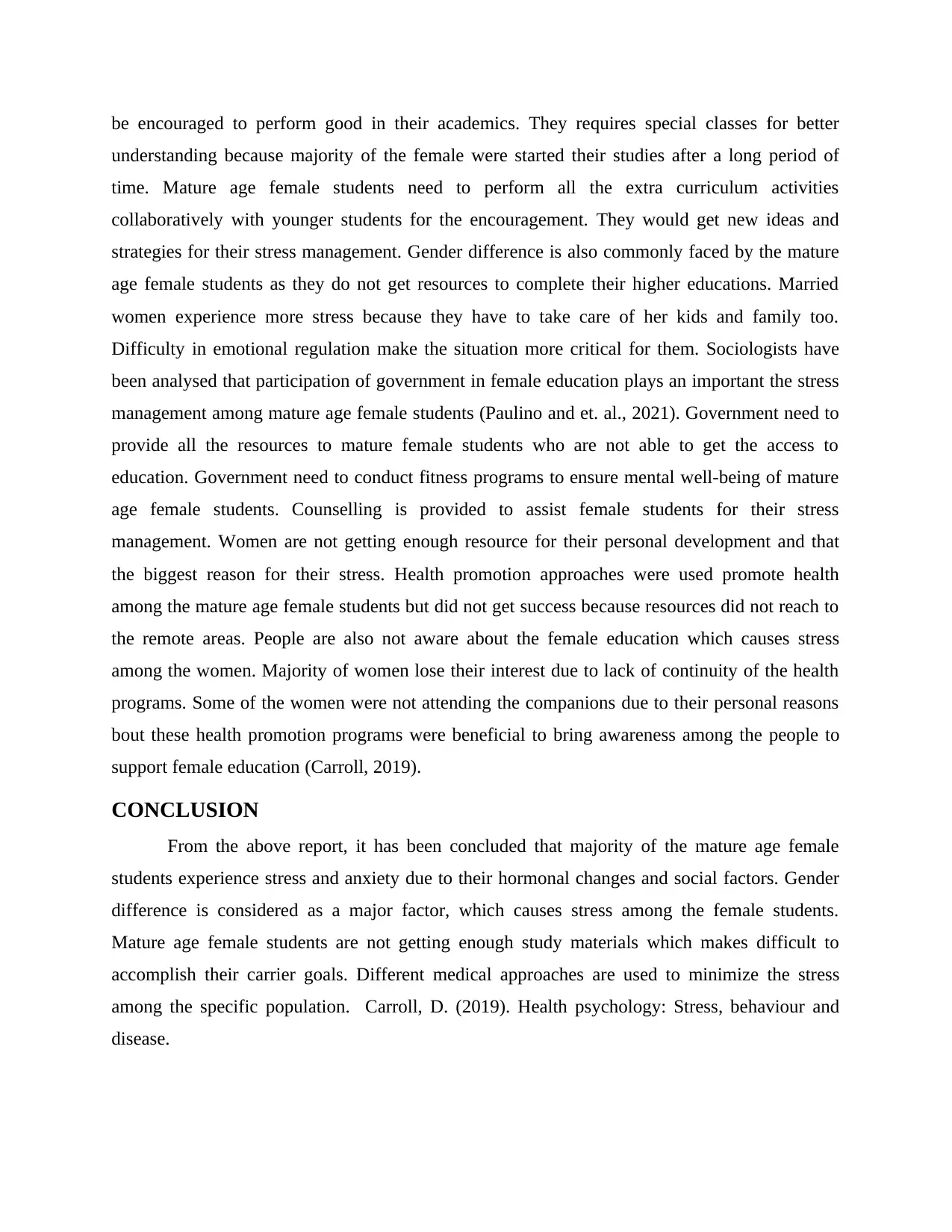
be encouraged to perform good in their academics. They requires special classes for better
understanding because majority of the female were started their studies after a long period of
time. Mature age female students need to perform all the extra curriculum activities
collaboratively with younger students for the encouragement. They would get new ideas and
strategies for their stress management. Gender difference is also commonly faced by the mature
age female students as they do not get resources to complete their higher educations. Married
women experience more stress because they have to take care of her kids and family too.
Difficulty in emotional regulation make the situation more critical for them. Sociologists have
been analysed that participation of government in female education plays an important the stress
management among mature age female students (Paulino and et. al., 2021). Government need to
provide all the resources to mature female students who are not able to get the access to
education. Government need to conduct fitness programs to ensure mental well-being of mature
age female students. Counselling is provided to assist female students for their stress
management. Women are not getting enough resource for their personal development and that
the biggest reason for their stress. Health promotion approaches were used promote health
among the mature age female students but did not get success because resources did not reach to
the remote areas. People are also not aware about the female education which causes stress
among the women. Majority of women lose their interest due to lack of continuity of the health
programs. Some of the women were not attending the companions due to their personal reasons
bout these health promotion programs were beneficial to bring awareness among the people to
support female education (Carroll, 2019).
CONCLUSION
From the above report, it has been concluded that majority of the mature age female
students experience stress and anxiety due to their hormonal changes and social factors. Gender
difference is considered as a major factor, which causes stress among the female students.
Mature age female students are not getting enough study materials which makes difficult to
accomplish their carrier goals. Different medical approaches are used to minimize the stress
among the specific population. Carroll, D. (2019). Health psychology: Stress, behaviour and
disease.
understanding because majority of the female were started their studies after a long period of
time. Mature age female students need to perform all the extra curriculum activities
collaboratively with younger students for the encouragement. They would get new ideas and
strategies for their stress management. Gender difference is also commonly faced by the mature
age female students as they do not get resources to complete their higher educations. Married
women experience more stress because they have to take care of her kids and family too.
Difficulty in emotional regulation make the situation more critical for them. Sociologists have
been analysed that participation of government in female education plays an important the stress
management among mature age female students (Paulino and et. al., 2021). Government need to
provide all the resources to mature female students who are not able to get the access to
education. Government need to conduct fitness programs to ensure mental well-being of mature
age female students. Counselling is provided to assist female students for their stress
management. Women are not getting enough resource for their personal development and that
the biggest reason for their stress. Health promotion approaches were used promote health
among the mature age female students but did not get success because resources did not reach to
the remote areas. People are also not aware about the female education which causes stress
among the women. Majority of women lose their interest due to lack of continuity of the health
programs. Some of the women were not attending the companions due to their personal reasons
bout these health promotion programs were beneficial to bring awareness among the people to
support female education (Carroll, 2019).
CONCLUSION
From the above report, it has been concluded that majority of the mature age female
students experience stress and anxiety due to their hormonal changes and social factors. Gender
difference is considered as a major factor, which causes stress among the female students.
Mature age female students are not getting enough study materials which makes difficult to
accomplish their carrier goals. Different medical approaches are used to minimize the stress
among the specific population. Carroll, D. (2019). Health psychology: Stress, behaviour and
disease.
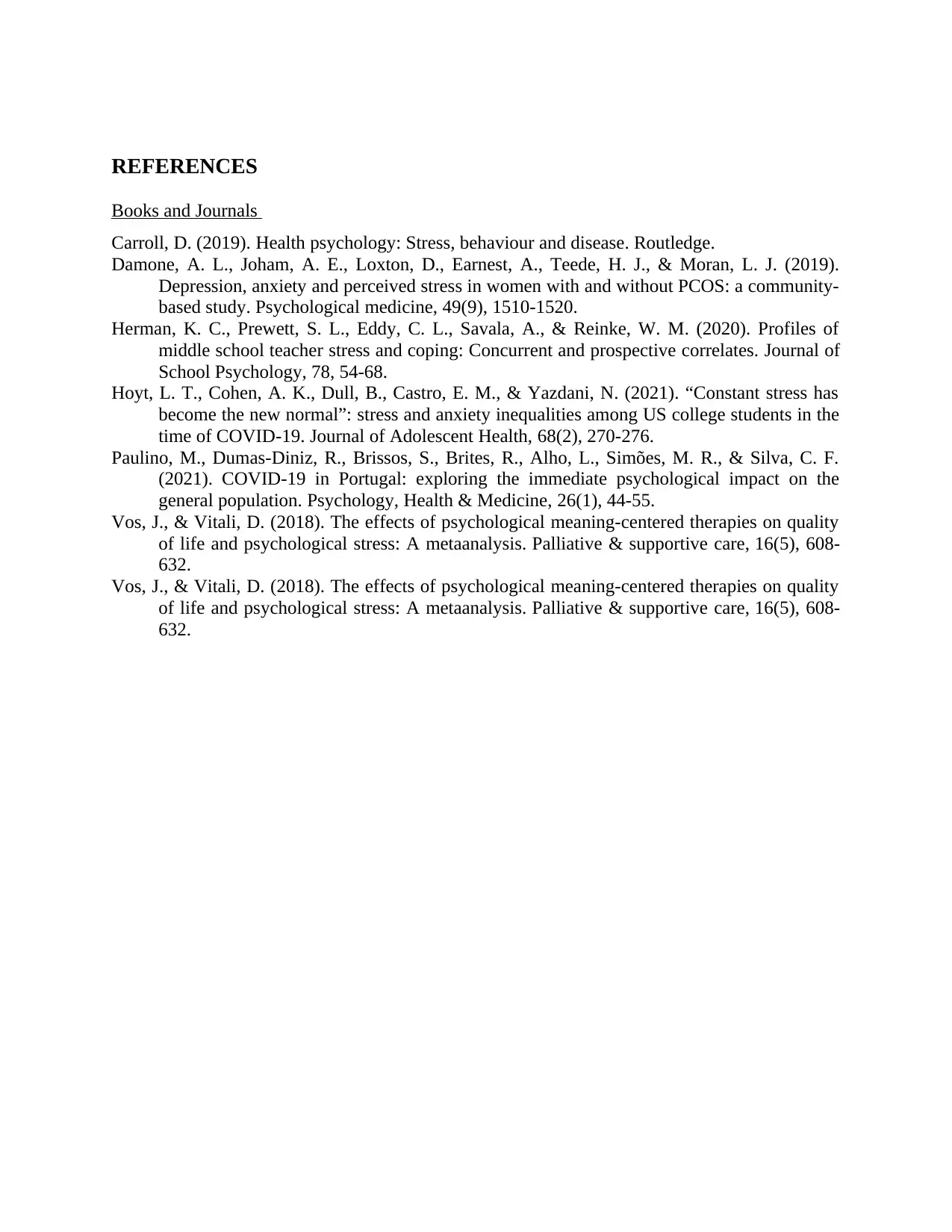
REFERENCES
Books and Journals
Carroll, D. (2019). Health psychology: Stress, behaviour and disease. Routledge.
Damone, A. L., Joham, A. E., Loxton, D., Earnest, A., Teede, H. J., & Moran, L. J. (2019).
Depression, anxiety and perceived stress in women with and without PCOS: a community-
based study. Psychological medicine, 49(9), 1510-1520.
Herman, K. C., Prewett, S. L., Eddy, C. L., Savala, A., & Reinke, W. M. (2020). Profiles of
middle school teacher stress and coping: Concurrent and prospective correlates. Journal of
School Psychology, 78, 54-68.
Hoyt, L. T., Cohen, A. K., Dull, B., Castro, E. M., & Yazdani, N. (2021). “Constant stress has
become the new normal”: stress and anxiety inequalities among US college students in the
time of COVID-19. Journal of Adolescent Health, 68(2), 270-276.
Paulino, M., Dumas-Diniz, R., Brissos, S., Brites, R., Alho, L., Simões, M. R., & Silva, C. F.
(2021). COVID-19 in Portugal: exploring the immediate psychological impact on the
general population. Psychology, Health & Medicine, 26(1), 44-55.
Vos, J., & Vitali, D. (2018). The effects of psychological meaning-centered therapies on quality
of life and psychological stress: A metaanalysis. Palliative & supportive care, 16(5), 608-
632.
Vos, J., & Vitali, D. (2018). The effects of psychological meaning-centered therapies on quality
of life and psychological stress: A metaanalysis. Palliative & supportive care, 16(5), 608-
632.
Books and Journals
Carroll, D. (2019). Health psychology: Stress, behaviour and disease. Routledge.
Damone, A. L., Joham, A. E., Loxton, D., Earnest, A., Teede, H. J., & Moran, L. J. (2019).
Depression, anxiety and perceived stress in women with and without PCOS: a community-
based study. Psychological medicine, 49(9), 1510-1520.
Herman, K. C., Prewett, S. L., Eddy, C. L., Savala, A., & Reinke, W. M. (2020). Profiles of
middle school teacher stress and coping: Concurrent and prospective correlates. Journal of
School Psychology, 78, 54-68.
Hoyt, L. T., Cohen, A. K., Dull, B., Castro, E. M., & Yazdani, N. (2021). “Constant stress has
become the new normal”: stress and anxiety inequalities among US college students in the
time of COVID-19. Journal of Adolescent Health, 68(2), 270-276.
Paulino, M., Dumas-Diniz, R., Brissos, S., Brites, R., Alho, L., Simões, M. R., & Silva, C. F.
(2021). COVID-19 in Portugal: exploring the immediate psychological impact on the
general population. Psychology, Health & Medicine, 26(1), 44-55.
Vos, J., & Vitali, D. (2018). The effects of psychological meaning-centered therapies on quality
of life and psychological stress: A metaanalysis. Palliative & supportive care, 16(5), 608-
632.
Vos, J., & Vitali, D. (2018). The effects of psychological meaning-centered therapies on quality
of life and psychological stress: A metaanalysis. Palliative & supportive care, 16(5), 608-
632.

1 out of 7
Related Documents
Your All-in-One AI-Powered Toolkit for Academic Success.
+13062052269
info@desklib.com
Available 24*7 on WhatsApp / Email
![[object Object]](/_next/static/media/star-bottom.7253800d.svg)
Unlock your academic potential
© 2024 | Zucol Services PVT LTD | All rights reserved.





